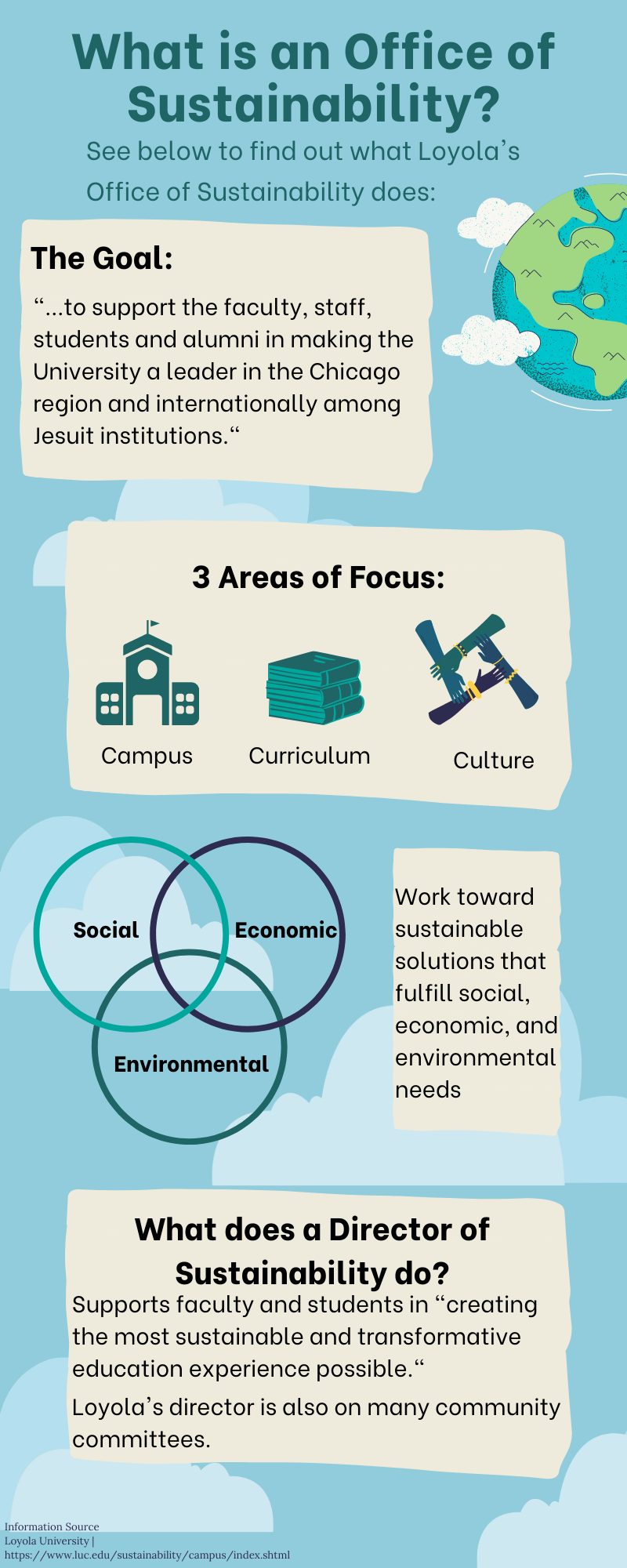“DePaul really needs to get serious about how we are going to deal with climate change.”
In 2009, professor James Montgomery and a coalition of faculty approached President Dennis Holtschneider asking to improve sustainability at DePaul. In turn, President Holtschneider launched a presidential taskforce to study the university’s sustainability, sparking a decade-long campus movement.
The Vice President of Facilities Operations, Bob Janis, has been steadily improving DePaul’s sustainability for decades while Montgomery spearheaded the effort for a holistic approach, grouping operations with engagement and curriculum. More recently, senior Wesley Janicki has been involved in campus efforts to improve sustainability. While various recommendations have come to fruition over the years, some are still waiting for their efforts to pay off.
C.O.R.E Changes
The organized mission to improve DePaul’s sustainability began in 2009, led by Environmental Science and Studies professor James Montgomery. Then President Holtschneider approved the formation of the Sustainability Initiatives Task Force (SITF), which aimed to study DePaul’s sustainability practices and suggest improvements.
The SITF was made up of four subcommittees based on the C.O.R.E model by the University of New Hampshire. C.O.R.E stands for four subsections of sustainability: curriculum, operations, research, and engagement.
“Father Dennis really liked [C.O.R.E] because he felt it addressed the major facets of … life at DePaul,” said Montgomery.
“I would contend that DePaul is always able to find money for things when it wants to, and I just don’t think they thought this was a priority.”
During their research, the group became affiliated with the Association for the Advancement of Sustainability in Higher Education (AASHE), according to Montgomery. In 2012, through AASHE, the SITF conducted a Sustainability Tracking, Assessment & Rating System (STARS) audit to measure DePaul’s sustainability. The audit resulted in a silver rating, the second highest, but DePaul has not conducted another audit since — despite some increased sustainability efforts.
Montgomery cited the cost and lack of commitment from administration as reasons DePaul stopped reporting to AASHE. More than five other Chicago Universities continue to report to AASHE and conduct STARS audits, earning gold and silver ratings.
Recommendations from each subcommittee, along with the results of the STARS survey, were synthesized into a report to be presented to the president, the provost and other members of the administration during the fall of 2011.
The curriculum committee recommended expanding and developing sustainability-related and focused courses. The operations committee suggested continuing to reduce greenhouse gasses and develop new sustainable practices for food service. The research group suggested creating infrastructure and staffing to continue environmental research, and the engagement group recommended enhancing co-curricular engagement focused on sustainability.
The committee presented the report just after President Holtschneider announced he was stepping down to make way for President A. Gabriel Esteban. This timing, said Montgomery, hurt the chances for the plan to be implemented. Ultimately, little was achieved.
“[T]he SITF was only around [from 2009-2012]… then it sunsetted into a new group called the DePaul Sustainability Network. And the goal there was to hopefully carry out the recommendations in the in the plan. That really never happened,” said Montgomery. “[O]perations has always done a lot. But, you know, with respect to curriculum and research and engagement … I don’t think any of those recommendations were ever really enacted.”
Even after the task force transitioned into the DePaul Sustainability Network, and administration failed to act on their recommendations, James Montgomery continued to press for updated and increased sustainability.
In 2017, Montgomery brought the possibility of creating an Office of Sustainability and hiring a sustainability coordinator to then-provost Marten denBoer. denBoer countered the idea with the option for faculty to continue working on sustainability as volunteers, said Montgomery.

“I am not pointing fingers at the former provost, but he basically was not supportive of creating an office and director [of sustainability] because of budget cuts. I would contend that DePaul is always able to find money for things when it wants to, and I just don’t think they thought this was a priority,” said Montgomery. “But this was one priority among many priorities … that’s the decision they made. I don’t agree with it. I think they missed out,”
After six years and little budge from administration, Montgomery decided he was done taking on leadership roles for DePaul’s sustainability.
“I’m not speaking for the others who were in that conversation. But for me, I threw up my hands and said, ‘I’m done.’ So, I’m really not a part of the new sustainability group, because I have a bit of a bitter taste about what happened,” said Montgomery.
Montgomery also sees a need for “new faces and fresh ideas” in sustainability efforts on campus.
“I know I sound bitter because it was a bitter pill to swallow. But that being said, I’m highly supportive again from the sidelines for this new group,” said Montgomery.
Sustainability Efforts Today
This year, senior Wesley Janicki — along with other students and faculty — started the DePaul Sustainability Group. Janicki has been working on sustainability at DePaul since his sophomore year when he was elected executive vice president of operations for DePaul’s Student Government Association (SGA).
The group began surveying student needs this past school year, according to Janicki. In October 2020, the group put four “Student Pulse” questions concerning university sustainability on DePaul’s official Facebook, Twitter, LinkedIn and Instagram accounts. The questions asked students if sustainability was important to them, if they were aware of DePaul’s current sustainability efforts, if DePaul should be more sustainable and if DePaul should adopt a sustainability plan.
“We got like 3,000 responses or something crazy, which was like three times[the responses on other posts],” said Janicki.
Ninety-four percent of respondents said that sustainability was important to them. When asked if they knew about DePaul’s sustainability efforts, 80 percent of respondents said they didn’t. Of the final two questions, 93 percent of respondents said they wanted DePaul to be more sustainable and 95 percent said that they would support a DePaul sustainability plan. More than 9,000 responses were recorded across all social media platforms and all four questions.
In May 2021, SGA included two referendum questions on the SGA Election ballot. One asked students about their opinions on keeping DePaul’s partnership with the Federation of Police. The other asked students for their thoughts on a possible $5 “green fee” each quarter to fund sustainability efforts on campus. Students voted 83 percent (or 517 votes) in support of the initiative.
The Vice President of Facilities Operations Bob Janis regularly fields questions about DePaul’s current sustainability efforts from students. Janis has been involved in improving sustainability on campus for decades. He also headed the operations subcommittee of SITF.
“It’s also been kind of an interesting thing that happened that over the years, there have been these conversations with … the new group of groups of students who have come through, [asking] what is DePaul doing about sustainability? And, you know, why isn’t there anything going on around sustainability?” said Janis.
In answer to these questions, Janis provides students with a six-page document listing ways that DePaul is working to increase sustainability. He does, however, wish there was more of an effort from the university to advertise these measures.
“I think DePaul, comparatively speaking, has been lagging behind some of these other local institutions.”
“It would be nice at some point for, you know, everybody to become more aware of what we’re doing,” he said. “There have been some efforts along the line [of an informational campaign]. It would be nice if others outside of [Facilities Operations] got involved in that … It just continues to be, there is a level of frustration.”
Looking Ahead
Over the next few years, Janis says Facilities Operations plans to continue to decrease DePaul’s carbon footprint and continue to update and replace out of date and unsustainable practices at DePaul.
According to the carbon footprint report Facilities Operations releases every few years, DePaul has reduced its carbon footprint by 41 percent since 2002. DePaul is also on track to reduce its carbon footprint 80 percent by 2040.
“When you look at the stats around [DePaul’s solar energy], even though you know, these are not like farm field equivalent solar installations, I think it’s still something to be you know, pretty happy about, pretty proud of,” said Janis.
Looking ahead, Janis has one dream project he would love to complete.
“I would like to get into a freshwater saving project in the form of going into each and every one of our men’s bathrooms across both campuses and installing waterless urinals,” said Janis. “[T]he amount of water saved is tremendous.”
Northwestern University, Loyola University Chicago and University of Illinois-Chicago (UIC) all have an Office of Sustainability with a dedicated Director or Chancellor of Sustainability. DePaul has yet to commit to either.
“I think DePaul, comparatively speaking, has been lagging behind some of these other local institutions,” said Montgomery.
SGA and the DePaul Sustainability Group continue to push administration to adopt the sustainability plan and a coordinator. In the spring, SGA brought these possibilities in front of Vice President for Strategic Initiatives and Chief of Staff, Steve Stoute, Chief of Staff and Senior Associate Vice President, Alyssa Kupka, Associate Vice President, Administration and Operations Betty Shanahan and Assistant Vice President and Chief of Staff for Student Affairs Ellen Meents-DeCaigny.
“They told us they didn’t have the money to hire a coordinator, but they wanted to give us a plan,” said Janicki. “They were kind of all over the place and I’m not clear if they actually want to do a plan or want to do the [C.O.R.E] sustainability plan.”
During the 2020 to 2021 school year, DePaul updated its mission. The new mission expressly mentions the environment, stating DePaul promotes “peaceful, just, and equitable solutions to social and environmental challenges.” This change has raised Janicki’s hopes about the future of sustainability at DePaul.
“Even if they don’t live up to their Vincentian mission all the time, [DePaul] at least likes to claim that they’re mission-driven. Having environmental sustainability in [the mission] will make it easier to push them,” said Janicki.
This fall, DePaul started the search for faculty and staff for the President’s Committee on Sustainability. According to the call for staff, the committee will have six faculty members, four staff members and two students. The purpose of the committee will be to advise administration on the best sustainable practices for the university.
“Because of [the new mission] we decided to create a committee to make sustainability an essential part of the new project DePaul is launching in October, Just DePaul,” said Rev. Guillermo Campuzano, liaison for the committee and the Division of Mission and Ministry. “We are concerned today with social and environmental justice following the intuition of Pope Francis in his encyclical, Laudato Si’.”
When presented with the idea of a committee, Janicki was excited about the prospect.
“I was like that is absolutely something we should do,” he said. “I was kind of surprised there wasn’t already a committee like this in existence.”
Observing from the sidelines, Montgomery is also cautiously hopeful about the future.
“I’m hopeful. I really do hope, I really think now … with climate change and other things going on that this is the time where DePaul really needs to get serious about how we are going to deal with climate change,” he said.
Header image by Aylene Lopez




NO COMMENT